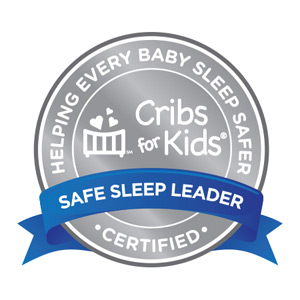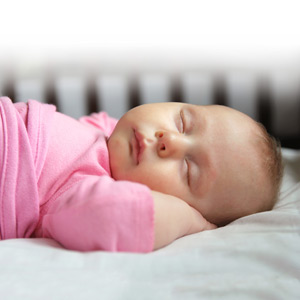Trident and Summerville Medical Centers are proud to promote safe sleep practices to new parents. The hospitals recently received the Silver Safe Sleep Hospital Certification through Cribs for Kids®. The hospitals are the first in the Lowcountry and second in South Carolina to earn the Certification.

The Cribs for Kids® Safe Sleep Hospital Certification program recognizes hospitals that demonstrate a commitment to reducing infant sleep related deaths. Each year in the U.S. there are nearly 3,500 infant sleep-related deaths due to accidental suffocation, strangulation, or undetermined causes during sleep. Nurses promote safe sleep best practices in the hospital and provide education to parents so they understand the importance of safe sleep environments at home.
What can parents do to promote safe sleep? Use the following tips to ensure your baby's safety:
TIP #1 - Always place your baby alone, on his or her back, in a crib for EVERY sleep time.
TIP #2 - Always use a firm, flat sleep surface. Car seats and other sitting devices, swings, wedges, and devices that position baby on an incline are NOT SAFE for routine sleep.
TIP #3 - Use a firm sleep surface with a firm crib mattress, covered by a fitted sheet.
"A crib, bassinet, or portable crib/play yard that conforms to the safety standards of the Consumer Product Safety Commission and ASTM International (formerly the American Society for Testing and Materials) is recommended. In addition, parents and providers should check to make sure that the product has not been recalled. Cribs with missing hardware should not be used, and the parent or provider should not attempt to fix broken components of a crib, because many deaths are associated with cribs that are broken or have missing parts (including those that have presumably been fixed).
Local organizations throughout the United States can help to provide low-cost or free cribs or play yards for families with financial constraints." (from the AAP 2011 Policy Statement-SIDS and Other Sleep-Related Infant Deaths: Expansion of Recommendations)
TIP #4 - Room Share, but do not bed share.
Co-sleeping: This is when a parent and child sleep within a "sensory" distance of each other, meaning that each can tell that the other is near, by their touch, sight, or even smell. (Co-sleeping is sometimes also called sleep-sharing.)
Room-sharing and bed-sharing are types of co-sleeping:

- Room-sharing: This is when parents have a crib in the room with them, a bassinet or portable crib near the bed, a separate crib attached to the bed, or a similar arrangement.
- Bed-sharing: This is when parents share their bed with their children (sometimes called the "family bed"). This is NOT recommended as a form of safe sleep. Various U.S. medical groups warn parents not to place their infants to sleep in adult beds due to serious safety risks. Bed-sharing puts babies at risk of suffocation, strangulation, and sudden infant death syndrome (SIDS). Studies have found that bed-sharing is the most common cause of deaths in babies, especially those 3 months and younger.
TIP #5 - Avoid smoke exposure during pregnancy and after your baby is born. There should be no smoking near pregnant women or infants. Set strict rules for smoke free homes and cars. Eliminate second-hand tobacco smoke from all places in which children and other nonsmokers spend time.
Follow the Summerville Medical Center Facebook page for more safe sleep tips.
A number of parent education classes are offered through our Women's and Children's service line each month. Visit http://sumdoc.co/summervillebaby for more information.
$webqFacilityNumber
Need a Physician?